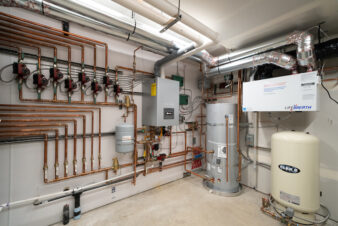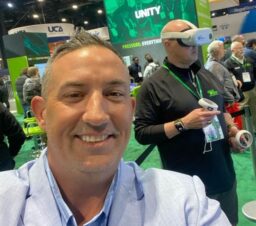Washington, D.C. – In line with American public opinion, Plumbing Manufacturers International (PMI) members want safe and efficient water infrastructure, fair international trade that creates American jobs, and tax reforms that encourage investment and create growth. A delegation of PMI member executives took to Capitol Hill this week to tell Congressional representatives about the important public health and economic roles their companies play while advocating for the EPA’s WaterSense program and pro-growth tax and trade policies during PMI’s annual Executive Forum and Fly-In.
PMI members attend the meeting each year to gain insights into economic trends from expert presenters and to strategize about how to further their interests within the current political environment. “The Fly In enables us to learn more about priority issues and brings about ‘ah ha’ moments through which you gain new insights,” said PMI Board President Pete Jahrling, director, product engineering/intellectual property, Sloan Valve Company. “I can report these learnings to my management, discuss what they mean to us, and plan how to gain the best advantage.”
Advocating for WaterSense preservation and codification
The delegation urged lawmakers to support bipartisan measures to ensure that the WaterSense program is preserved and codified, including the Clean Safe Reliable Water Infrastructure Act (S. 1137), Water Efficiency Improvement Act of 2017 (S. 1700), and Water Advanced Technologies for Efficient Resource Use Act of 2017 (H.R. 3248).
“In slightly more than a decade, WaterSense has transformed water efficiency in the U.S. – saving 2.1 trillion gallons of water and $46.3 billion in water and energy bills,” said Kerry Stackpole, PMI CEO/executive director. “Plumbing manufacturers have developed 21,000 WaterSense-labeled product models, including toilets, showerheads and faucets. WaterSense is a federal program that works – it has achieved quantifiable water and energy savings, a rave review from the EPA inspector general, and bipartisan support.”
The PMI advocacy team also urged support of the bipartisan Water Conservation Rebate Tax Parity Act (H.R. 448/S. 1464), which would amend the federal tax law to exclude homeowners from paying federal income tax on rebates from water utilities for water conservation improvements, including the purchase of products certified by the WaterSense program. See PMI’s WaterSense issue brief.
“This meeting provides a forum for PMI members to examine key, pertinent issues within our industry and to develop a collective vision of how to move the industry forward,” said Misty Guard, International Code Council vice president and PMI member.
Urging lawmakers to undertake pro-growth, comprehensive tax reform
The PMI group urged members of Congress to pursue tax reform legislation that achieves the following goals:
Reduced tax rates for companies of all sizes, no matter how they are organized, to gain after-tax income that plumbing manufacturers can reinvest to grow their businesses.
Permanent estate tax repeal that will enable family-owned plumbing manufacturing businesses to operate for future generations. Several PMI member companies are family-owned.
Full expensing for capital equipment that retains a robust capital cost-recovery system, such as accelerated depreciation and full expensing, to drive new investments and create new jobs.
Strong and permanent research and development incentives to boost U.S. innovation.
Shift to a territorial system of taxation in place of worldwide taxation, so that businesses aren’t double-taxed on income earned overseas.
See PMI’s tax reform issue brief.
“All the PMI members work to support the efforts of their individual companies. The Fly In allows us to share ideas and learnings with other member companies about legislative issues that we are all stakeholders in,” said Michael Miller, PMI board member and director of product partnerships, LSP.
Supporting the modernization of NAFTA
PMI executives support updating and modernizing the 23-year-old North American Free Trade Agreement (NAFTA) to help expand manufacturing in the United States and improve America’s global competitiveness.
For U.S. plumbing manufacturers, standards and conformity assessment issues in Mexico (certification, inspection, sampling and testing, and accreditation) serve as the largest non-tariff barriers to trade in the sector. These types of barriers are burdensome for all building product exporters. The PMI group asserted the necessity to ensure that any renegotiation does not set back U.S. manufacturing. Changes to NAFTA that would raise taxes, tariffs, merchandise processing fees, and other cost barriers will undermine the agreement and U.S. manufacturing.
PMI’s goals in relation to NAFTA are:
• Eliminating remaining distortions and barriers in Canada and Mexico.
• Raising standards to U.S. levels, including science-based regulatory practices, transparency, competition, the protection of private property, investment overseas, and intellectual property.
• Greater collaboration by the United States, Canada and Mexico to take action against trade cheating from other countries.
• Modern and streamlined customs rules and processes to facilitate trade, such as electronic forms.
• Maintaining and enhancing neutral and strong enforcement mechanisms.
See PMI’s NAFTA issue brief.




Join the conversation: